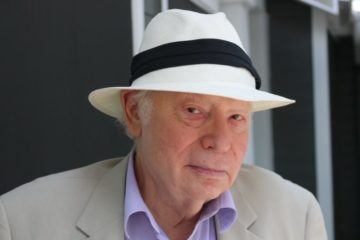Graham Farmelo at his own website:
 ‘The greatest living theoretical physicist’ – many commentators in the past few decades have described Steven Weinberg in such terms. When I rather cheekily asked him what he thought of that statement, he shot back: ‘It is quite ridiculous to rank scientists like that’, adding with a twinkle in his eye, ‘but it would be impolite to dispute the conclusion’. That reply was classic Weinberg: self-aware, intimidatingly direct but always ready to lighten the moment with humour.
‘The greatest living theoretical physicist’ – many commentators in the past few decades have described Steven Weinberg in such terms. When I rather cheekily asked him what he thought of that statement, he shot back: ‘It is quite ridiculous to rank scientists like that’, adding with a twinkle in his eye, ‘but it would be impolite to dispute the conclusion’. That reply was classic Weinberg: self-aware, intimidatingly direct but always ready to lighten the moment with humour.
After Weinberg died on 23 July 2021, at the age of 88, there was a great sense of loss among physicists. For more than half a century, he had been an outstandingly productive researcher and one of his subject’s most forceful and eloquent ambassadors. He loved physics with a passion and made no apology for regarding the physicist’s way of looking at the world as uniquely valuable.
It had been clear from his days at school in the Bronx that he was extremely bright, exceptionally diligent and destined to be a formidable physical scientist. He excelled at university as a physics student, but – as he often told me – he did not take quickly to research because of his mistaken view that a scientist has to know everything about a topic before making creative contributions to it. It was this attitude, he said, that prevented him from making the most of his stay in 1954-55 at the Institute of Theoretical Physics in Copenhagen, where he met quantum pioneer Niels Bohr (‘he was very kind, but I never got to know him’, Weinberg later told me). Fifteen years later, he was at the front rank of theorists, determined to make his name in ‘fundamental physics’, as he called it – the study of the most basic forces and the most basic entities of nature.
More here.
